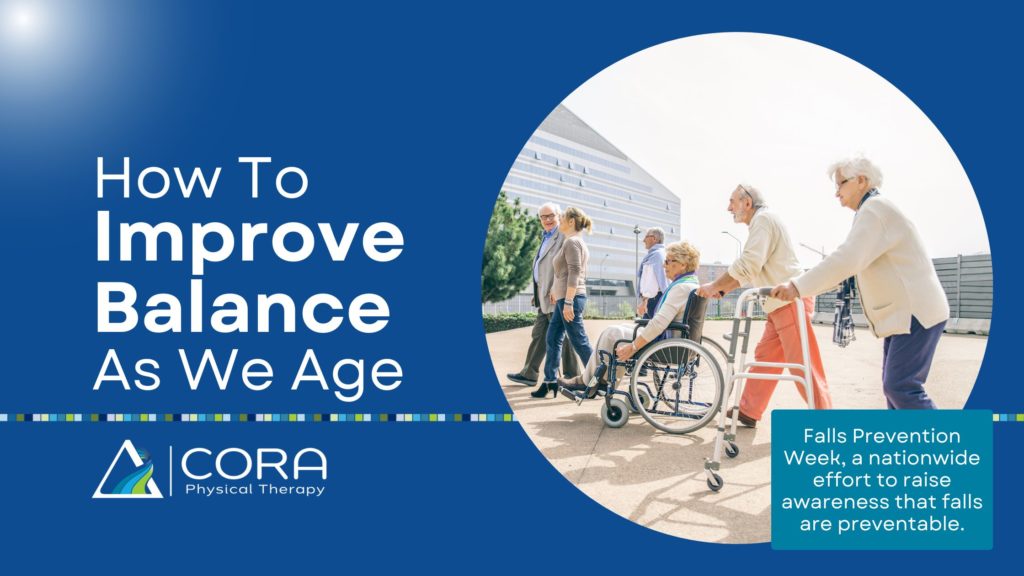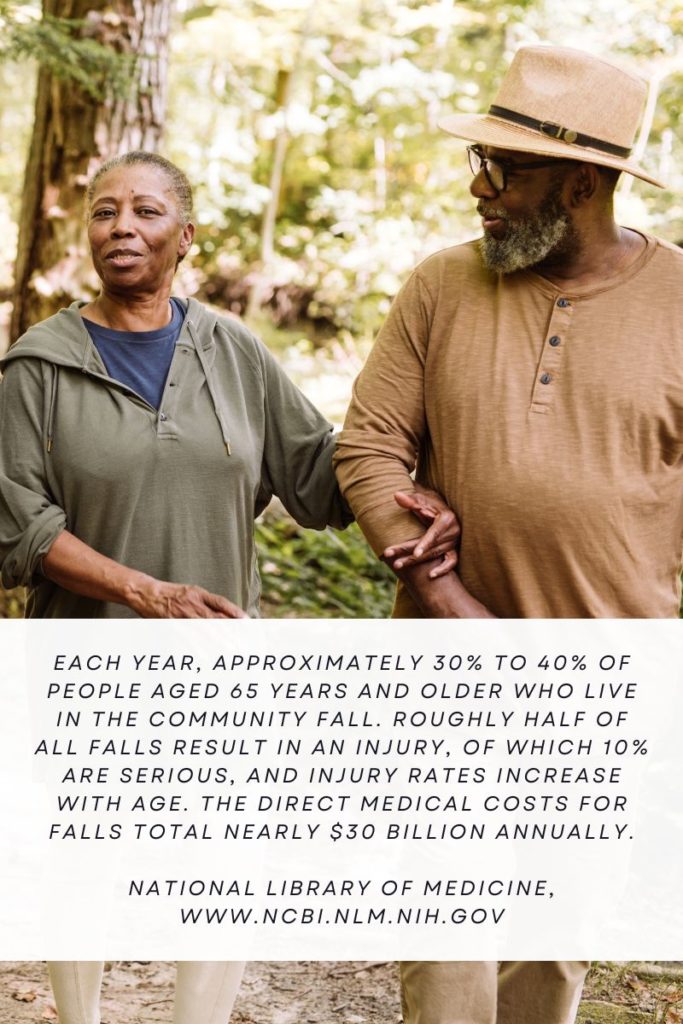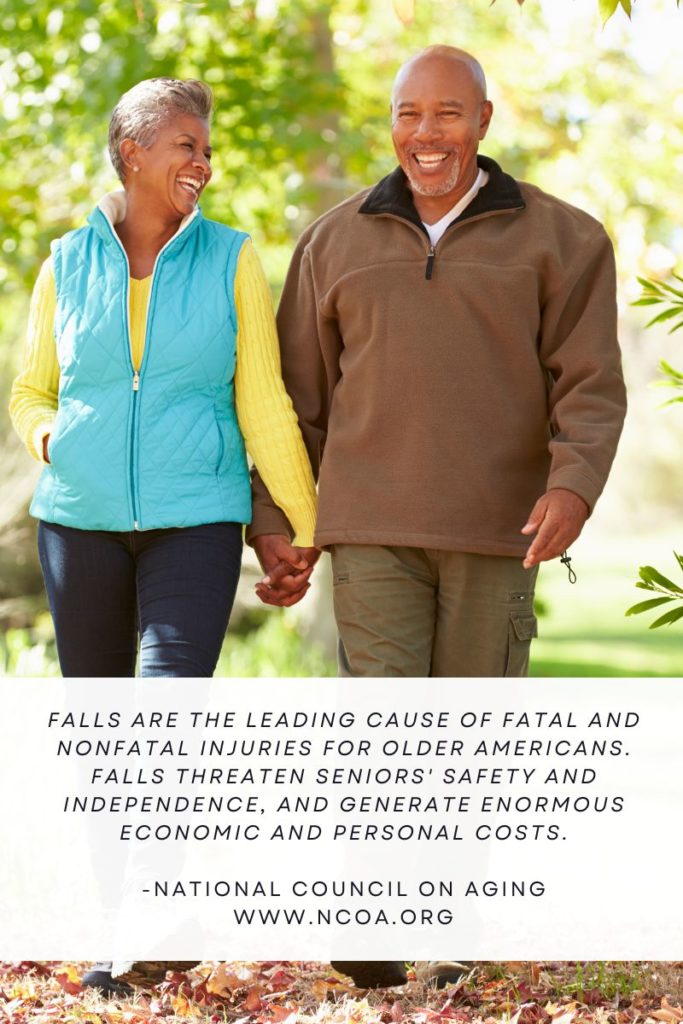
Can we do anything to prevent falls? Yes! By staying active and strengthening the core and lower-body muscles that help us stay steady on our feet, we can maintain our balance and prevent falls.
Balance is the ability to distribute weight in a way that will let us hold a steady position or move independently without falling. As we age, the muscles that help us to stand tall begin to weaken, our stride shortens, our steps begin to slow, and our vision isn’t quite as sharp as it used to be.
Aging can also affect our sense of balance, which prompts many seniors to exercise less and become more sedentary, which in turn leads to further loss of balance — a vicious cycle.
Building Balance

An effective exercise program helps build strength, flexibility, and balance. Some ways to challenge and improve balance include:
- Standing on one foot for 30 seconds on each side
- Walking heel-to-toe for 20 steps
- Going from sitting to standing without using your hands
- Doing heel raises 10 to 20 times, rising up on your toes as far as you can while standing
- Practicing yoga or tai chi, an ancient Chinese mind-body practice that improves both balance and muscle tone
Falls are the leading cause of fatal and nonfatal injuries for older Americans. Falls threaten seniors’ safety and independence, and generate enormous economic and personal costs.
National Council on Aging, www.ncoa.org
In 2005, PubMed.gov conducted a randomized, controlled trial to determine the effects of tai chi on 256 physically inactive older adults. It found that people ages 70 to 92 who practiced tai chi three times a week for six months lowered their risk of falling by 55 percent.
Falls Prevention Awareness Week
Each year, the beginning of the Fall season has been designated as Falls Prevention Awareness Week. Aging itself does not cause falls, but falling is the leading cause of injury-related deaths among those 65 or older, according to the National Safety Council. More than 33,000 individuals died from falls in 2015, most of them 65 or older.
Falls Prevention Week is a nationwide effort to raise awareness that falls are preventable. Encourage older adults to be falls free and independent by leveraging NCOA’s Falls Prevention Awareness Week Promotion Toolkit.
National Council on Again, www.ncao.org

While falls can occur anywhere, they most often happen at home, due to:
- Poor lighting
- Clutter
- Electrical cords
- Loose rugs
- Uneven surfaces
- Steep stairways
- Slippery or wet surfaces, such as bathtubs and showers
- Inaccessibility of household items, making climbing on a stepstool or ladder necessary
Balance and Fall Risk Assessment
Certified physical therapists can examine you and assess your balance and risk of falling. Guidelines published by the American Geriatrics Society and British Geriatrics Society (AGS/BGS) recommend screening adults 65 and older for fall risk every year.
Each year, approximately 30% to 40% of people aged 65 years and older who live in the community fall. Roughly half of all falls result in an injury, of which 10% are serious, and injury rates increase with age. The direct medical costs for falls total nearly $30 billion annually.
National Library of Medicine, www.ncbi.nlm.nih.gov
A balance and fall screen may include questions about your history of falling in the past year, and if there was a need for medical attention. Even if you have not fallen, a comprehensive evaluation and balance training are key in preventing potential slips and trips, helping you live without the fear of an accidental fall.
Because the aging process can affect vision, strength and balance, adults 65 and older are at elevated risk for falls. However, falls are not a natural part of aging and can be prevented.
National Safety Council, www.nsc.org
Want to Improve your Balance? Physical Therapy Can Help.
Physical therapists employ tailored balance re-training exercises, gait training, safety training, and muscle strengthening to help those who are struggling with balance issues due to injury or aging. Our advice is to take action now. Licensed therapists are ready to help you live a safe, healthy life.
Schedule a Balance Evaluation
Easy online scheduling at 250+ locations
